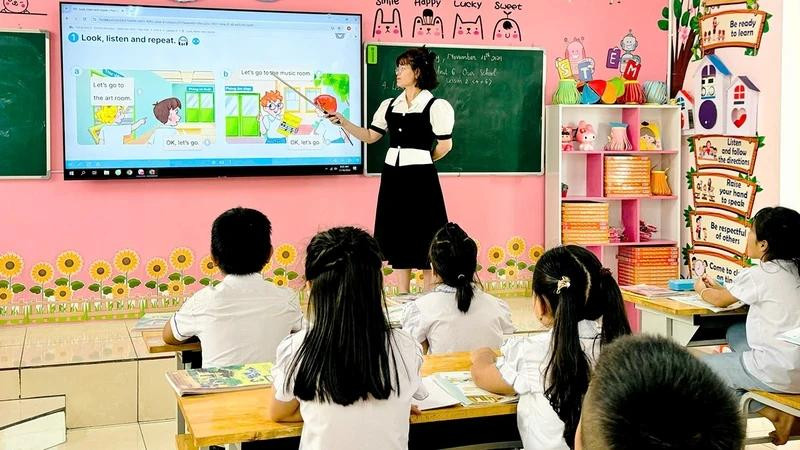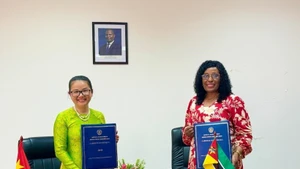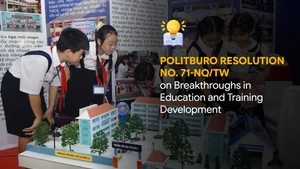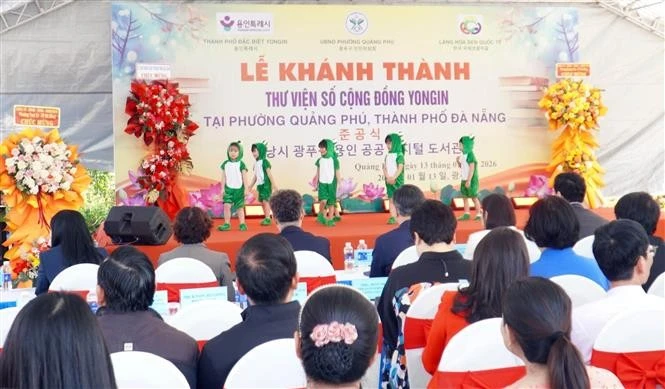For the education sector, educating students to become global citizens requires a focus on foreign language training alongside comprehensive knowledge acquisition. This is a crucial task that helps students communicate more confidently and seize a wider range of development opportunities.
As a suburban district of the capital Hanoi, Ba Vi still faces more challenges compared to the city’s overall educational standard. As such, since 2019, the district’s education sector has concentrated on implementing solutions to improve foreign language teaching and learning, with notable progress to date.
Sharing some implemented strategies, Phung Ngoc Oanh, Head of the Ba Vi Bureau Education and Training, noted that the sector has advised local authorities in developing a plan to enhance the quality of foreign language teaching and learning. The implementation of the plan has been carefully phased and meticulously calculated.
In 2019, the district piloted the programme in 10 out of 35 secondary schools before expanding to all 35 schools after a year of effective implementation. By 2025, the programme will be implemented in all 69 secondary and primary schools in the district.
Notably, Ba Vi has also developed an English language environment for teachers and students by creating opportunities for students to become familiar with English through drawings, images, slogans, and decorative banners in schools and classrooms as well as organising book promotion events and English speaking competitions.
Furthermore, recognising teachers’ crucial role in improving educational quality, the Ba Vi Bureau of Education and Training has intensified professional development for English teachers and focused on applying information technology in teaching and learning through collaboration with service providers. Consequently, the quality of English teaching in the district’s schools has seen significant improvement.
An official from the Hanoi Department of Education and Training stated that the city is committed to enhancing students’ foreign language capabilities, gradually introducing English as a second language in schools.
Currently, Hanoi students’ foreign language proficiency ranks third among 63 provinces and cities nationwide. The city is determined to implement strategies to progressively establish English as a second language in schools. Additionally, Hanoi aims to train students to become global citizens who are not only professionally competent but also equipped with IT and language knowledge to facilitate integration with the world.
In Bac Ninh Province, the quality of English language education in recent years across educational levels has shown positive changes. The average English score in the high school graduation examination has remained stable and is among the top nationally. The number of students winning first and second prizes in the national English language competition over the past three years is 1.5 times that of the total from the preceding decade.
A representative of the Bac Ninh Department of Education and Training reported that currently, 66.9% of nursery children are introduced to English; 82.39% of first graders and 87.44% of second graders follow optional English programmes. Across the province, 100% of students from the third grade to the ninth grade are participating in the 10-year English programme; 13 out of 23 primary schools implement enhanced English teaching through mathematics and natural science subjects; 14 out of 23 primary schools and 9 out of 21 secondary schools deliver enhanced English teaching with foreign teachers; and 100% of the province’s English teachers meet or exceed standard language proficiency requirements.
Lao Cai is also a province focusing on English language development in schools. Duong Bich Nguyet, Director of the Lao Cai Department of Education and Training, stated that the department has advised the provincial government to issue a plan to improve foreign language teaching and learning in Lao Cai’s educational institutions for the 2021-2025 period.
The province has identified the urgency and importance of foreign language teaching and learning to innovate, create breakthroughs, and enhance the quality of educational institutions. Lao Cai encourages businesses to establish international schools; implement the 10-year English programme across school levels; and improve foreign language capabilities to meet learning, working, and international integration needs.
The province also guides educational institutions to develop teaching partnerships with international elements and encourages units to explore and participate in international intelligence and scientific competitions in English.
According to Pham Ngoc Thuong, Deputy Minister of Education and Training, foreign language teaching and learning is of special concern to the education sector. Proficiency in foreign languages not only helps students engage in cultural exchange but also enhances individual competitiveness and contributes to the country’s sustainable development.
The Ministry of Education and Training will advise the government to soon issue a national-level plan to introduce English as a second language in schools, including solutions for human resources, policy mechanisms, teacher training and development, and creating opportunities for native English-speaking teachers to collaborate and work in Vietnam.
















